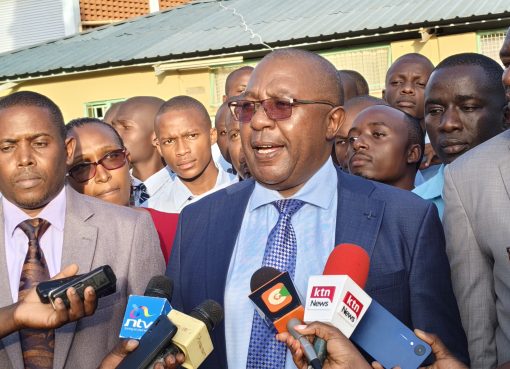After graduating with a bachelor’s degree in Actuarial Sciences in 2015, Daniel Tutti Karanja thought of how he would touch the lives of the youth in the little known Munanda Village in Subukia Sub-County where he had grown up.
It soon dawned on him that the sleepy hamlet brow-beaten by the very difficult nature of living in poverty was under the grip of all manner of vices ranging from drug abuse, organized gangs, rampant teenage pregnancies, child labour and alcoholism.
After a brief analysis of events, the Kisii University alumni says that he also discovered that most primary and secondary school children in the region had low educational aspirations which he noted was a major drawback to learning outcomes and school completion rates.
He also quickly realized that educational achievement could be increased by intervention of role models and as a way of giving back to the same society that nurtured him, he resolved to start offering mentorship to the youth free of charge.
“The emergence of modern lifestyles has seen family structures change, and those adults who traditionally used to guide the youth are no longer available.
Advancements in technology have exposed the vulnerable youngsters to an illusionary world of fantasies in movies, magazines and social media. Our youth now more than ever need formally organized and credible mentoring,” says Karanja.
The initiative which he started with only five pupils has as at now touched the lives of hundreds and currently he has teamed up with four other former university students to mentor 180 upper primary and secondary school learners.
“We set aside time to mentor and counsel these children during weekly sessions, with a motive of aiding them live on the positive side of life.
The programme seeks to provide accurate information on risks involved in illicit sex, drug abuse and exposure to social media so as to positively influence the character formation of the young people through modeling” he notes.
According to Joel Maina who joined the mentorship programme while in Form One and is currently in his second year of a university programme, the initiative has been quite beneficial because before it he was uncertain about his goals but was able to work it out with his mentors.
“It is great to have someone to walk the path with you and guide you to avoid making the same mistakes they made,” says Maina.
Aside from the confidence building, the mentees are also networked with professionals in various fields to get career insights as well as advice on ever evolving job market trends.
The core objective of the mentorship programme is to teach young people the need to appreciate the importance of virtues such as persistence, honesty and hard work as the foundation of success.
It also cautions the youth against the lure of quick riches and instills the virtue that one does not have to steal. It emphasizes that one can actually work hard and make money and do great things.
“We often invite resource persons to give talks which give our mentees exposure to connections that will enable them gain knowledge and skills, build networks and shape their career ambitions,” states Karanja.
A critical component of the programme involves mentoring students particularly girls in Science, Technology, Engineering, and Mathematics (STEM).
Karanja says their mentorship is crafted to complement a new plan developed by the Ministry of Education to be rolled out early in 2020 to improve girls’ performance in sciences, technology, engineering and mathematics.
“One of the ways we are employing to improve learning outcomes in these key subjects is to change the negative perception towards technical subjects particularly among girls. This has been a cause for concern. We are optimistic the new approach by various stakeholders will pay off,” explains Karanja.
Daniel Mwaniki also a volunteer working at the initiative says high population of young people, many of whom hail from poor backgrounds makes Munanda a target area for criminal gang recruiters and drug peddlers.
“As locals we realized that we were best placed for this kind of work, as it’s easier for us to identify who is vulnerable –who is known in the local community to engage in these vices,” says Mwaniki.
He says that the initiative invites industry leaders and educationists to inform, guide and assist youth to make best and informed career and educational choices based on the current trends and opportunities.
This is achieved through participants being engaged in field and industry visits, innovation challenges, exposure to networking opportunities and capacity building.
George Munyasia, a facilitator at the programme says they have identified factors that usually work in combination to lure young people into drug use and illicit sex.
He lists structural motivators such as high levels of youth unemployment, political, economic and social exclusion, proximity to violence or criminality, dysfunctional families and poverty.
Munyasia points a finger at individual incentives, which include seeking a sense of purpose, status and belonging as well as peer pressure.
“Some of these youth have low self-esteem, they don’t have critical thinking, and they can’t make decisions on their own. They are unemployed or engaged in child labour in quarries around the location which makes them good targets for violent radicals.
This two-sided picture of Kenyan youth indicates the competing forces of good and evil. We teach them that when you rule your mind, you rule your world,” says Munyasia.
It has not been a rosy project all through for the facilitators indicate that they lack funds to put up a bigger hall to cater for an increasing number of pupils and students coming for mentorship.
Karanja says that some of the resource persons called to mentor the students require facilitation fees, adding that other logistical challenges are making the venture difficult.
However the group has one resolve; that they will never give up.
By Anne Mwale




